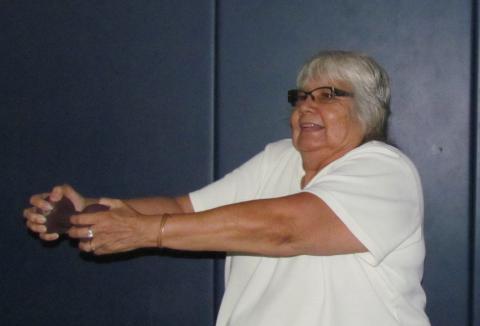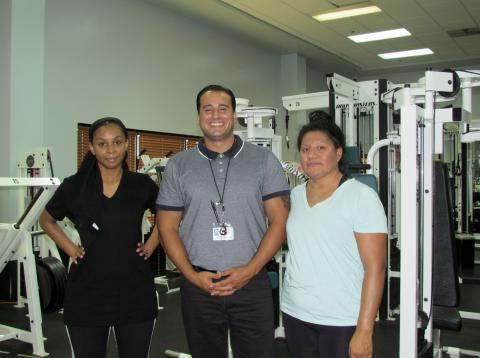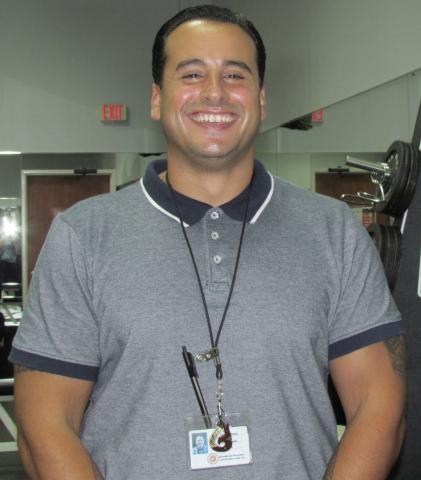Soboba hosts fitness classes ◆ By Mike Hiles
Tribal members from the Soboba Band of Luiseño Indians don't have to travel very far to get the benefit of a great workout with a personal trainer. Daniel Mazza offers free classes each week at the Soboba Sports Complex for those that want to learn how to get in shape and stay healthy.
Mazza is a Fitness Specialist for Riverside San Bernardino County Indian Health Inc. which operates several clinics for local tribes. He is part of the Diabetes Program team that helps patients with prevention and maintenance of the disease that is prevalent among Native Americans. All patients and Native Americans from all tribes are welcome to the classes.
"Our Diabetes Program is an awesome program," Mazza said. "Not only do we have fitness specialists on staff but Certified Diabetes Educators and a Registered Nurse. We also provide cooking classes and diabetes support groups for Native Americans in the area."
Two days a week, participants meet at the weight room inside the Soboba Sports Complex to do strength training and low impact workouts. On Fridays, water aerobics are offered at the complex's pool. Last month 24 people showed up for the class.
"The pool is very low impact so it's way better on your joints," said Mazza, 31. "All of our group fitness classes are ‘at your own pace' and we tell patients to do as much as you can but listen to your body."
He said there is a dedicated group of Soboba elders that usually attend and he customizes the classes by offering longer warm-up times, walking rather than sprinting and using lighter weights for strength training. He said sometimes the class just works on balance.
Mary Masiel heard about the classes through the Elders group she belongs to and tries to attend at least two days a week.
"The program is very good and I really enjoy it," said Masiel, 71. "Since I retired it was easy to get too relaxed."
Masiel was a driver for 24 years for RSBCIHI, transporting patients to their various appointments.
"I enjoyed doing that for my people to help them," she said. "I've been working since I was in my 20s so I want to stay active."
Mazza said when Mary's very active 93-year-old mother, Barbara Guanche, joins her at the classes, she does great.
"She gets it – she's always hustling," he said.
When there are a lot of participants, Mazza will partner them up so they can work together to achieve their goals for the day. He said one will do strength training while the other one does cardio, such as jumping jacks or squats. The purpose is to get the heartrate to go up and down. He said people can burn the same number of calories and/or fat with a targeted 30-minute workout than if they worked out for 60 to 90 minutes without direction.
Jodie Arres attends classes to stay fit and finds the Friday pool class very relaxing.
"I have hypertension and I try to keep healthy for my four girls," said Arres, 41.
Shakoora Kabeer has an eight-year-old she said she needs to keep up with, which is her motivation to attend classes. She said she has already noticed an increase in her energy level.
"I want to be a role model for my daughter," said Kabeer, 28. "I take pride in working out and I try to stick to a healthier diet but I know that you will not see results if you don't get out there and be active."
Mazza became a certified personal trainer in 2010 through the National Personal Training Institute.
"Fitness has always been a passion of mine; helping people reach their fitness goals and seeing them healthier and happier," he said. "I tell my patients that it takes time; it's not going to happen overnight. You have to trust the process and keep pushing to reach your goal."
He said that he has many close friends and family members that have Type 1 or Type 2 diabetes, making his efforts personal as well as professional. Statistics show that Native Americans have a greater chance of having diabetes than other racial/ethnic groups in the United States. Two out of three Native Americans who suffer kidney failure can attribute it to diabetes. Thirty percent of Native Americans are pre-diabetic.
"As long as I can remember, diabetes has been a problem in our community," said Mazza, who is a Cahuilla tribal member but lives on the Soboba Reservation. "Awareness has increased to try and regulate it and that's why fitness, nutrition and education are so important."
He conducts fitness classes at other local reservations that were started to give patients a variety of workouts, whether it's high intensity or low impact, bootcamp style or one-on-one training for specific movements or goals. Programs are based on patients' needs per their doctor's prescription. All sites – Soboba, Cahuilla, Morongo and Torres Martinez – have the same focus: to help pre-diabetic and diabetic patients start to live a healthier lifestyle.
"Whether it's making it easier to get out of a car or get up a flight of stairs, we are always making progress every week and having fun while doing it," Mazza said.
Information, 951-849-4761, ext. 1155.




